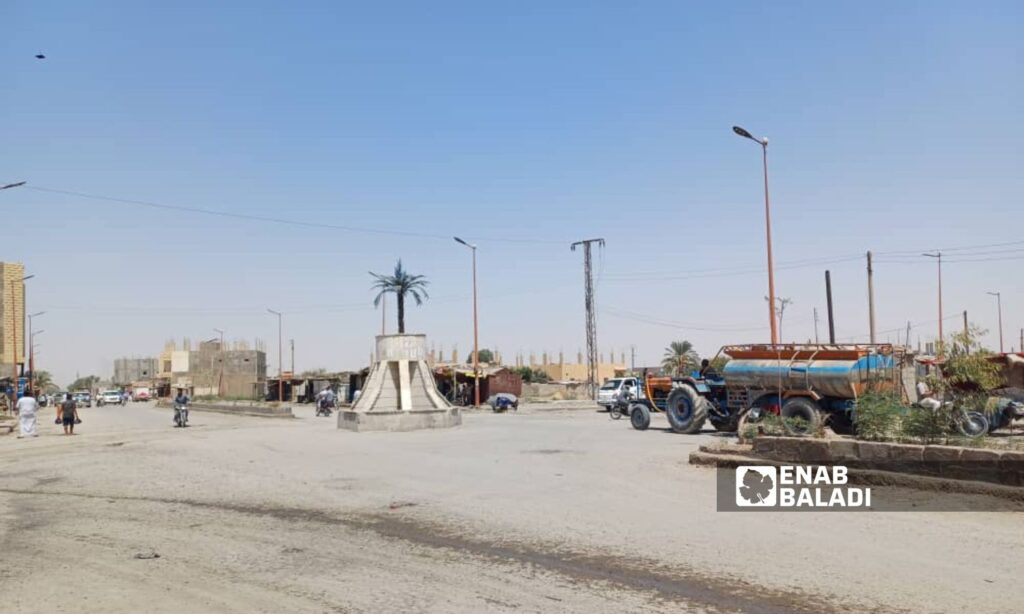Approximately a week ago, the Granij municipality affiliated with the Deir Ezzor Civil Council in the Autonomous Administration of North and East Syria (AANES) issued a decision to remove numerous stalls from the main street in the town of Granij in the eastern countryside of Deir Ezzor, citing violations and road expansion as reasons.
The decision followed the issuance of new commercial licenses for shops, leading the municipality to launch a campaign to remove the stalls at the beginning of last week.
In a previous comment to the local Bisaan FM radio station, the municipality stated that the removal of the stalls was in response to residents’ complaints about the difficulty of passing through the main street due to crowded street vendors.
The campaign to remove the stalls began early last week in the market area in the center of Granij city after the “violations” escalated, according to Mohammad al-Ghanem, the head of the technical office in the municipality, speaking to the local radio.
Al-Ghanem added that the campaign included the removal of unlicensed stalls and encroachments by shop owners on the sidewalk, as well as illegal constructions within some shops.
The municipal decision aggravated the suffering of the stall owners, as some of them told Enab Baladi. One of them, Saleh al-Eid, who owns a stall selling household gas in the town’s market, expressed his hardship due to the removal order.
Al-Eid said that the decision increased his and other residents’ suffering, emphasizing the need to secure a place for street vendors before issuing such a decision, especially given the high rental costs of commercial shops, which can reach up to 100 US dollars per month, a significant amount for the town’s residents.
Mehdi al-Hussein, also a resident of Granij, told Enab Baladi that while the municipality has the right to reduce the number of stalls on the main street and invest in the market by renting out commercial shops, alternatives must be provided for locals who rely on their income from these stalls.
Absence of alternatives
These stalls are a livelihood source for poor families, operated by young men and children on daily wages, and also serve traders promoting their goods.
Samir al-Kamal, a clothing trader from Granij, told Enab Baladi that the decision forced him to lay off eight workers who operated his stalls on daily wages.
He added that the decision was made without addressing the organization of the work for the stall owners or their workers.
Work on these stalls is not limited to men; Mona al-Muhaimid, who sells used items on a stall in the same town, said she cannot afford to rent a shop as desired by the municipality due to high rental costs.
She told Enab Baladi that shop rental costs no less than 50 dollars per month, and for her, that money is better spent on her family as she supports a family of four children with no other breadwinner.
Al-Muhaimid, along with others, is now searching for an alternative place to conduct their simple commercial activities (stalls) outside the authority of Granij municipality, to save some money that could support them in the deteriorating economic situation in the region.
She added that many stall owners have previously suffered from high shop rental costs, forcing them to work on the streets, enduring the heat of summer and the cold of winter, as mobile vendors.
Extremely grim situation
In a special interview with the Saudi Al-Arabiya channel, UN envoy to Syria Geir Pedersen conducted a quick survey of the main unresolved issues in the Syrian file, starting with the issue of detainees and missing persons, the economic and humanitarian crisis, and the presence of about 12 million displaced people.
Pedersen stated in the interview in May, “Assad cannot determine the outcome of the conflict in Syria, nor can the Russians, Iranians, Turks, or Americans, nor anyone,” considering the situation in Syria “extremely grim” with about 16.9 million in need of humanitarian aid and nine out of ten people living in poverty.
In Syria, 16.7 million people need humanitarian assistance, an increase of 9% compared to 2023, according to estimates by the United Nations High Commissioner for Refugees (UNHCR).
Eighty percent of the Syrian population will need some form of humanitarian assistance in 2024, according to a statistic released on February 12 by the World Food Programme (WFP) about the number of people suffering from food insecurity in Syria.
About 55% of the population, or 12.9 million people, suffer from food insecurity, with 3.1 million severely food insecure.

